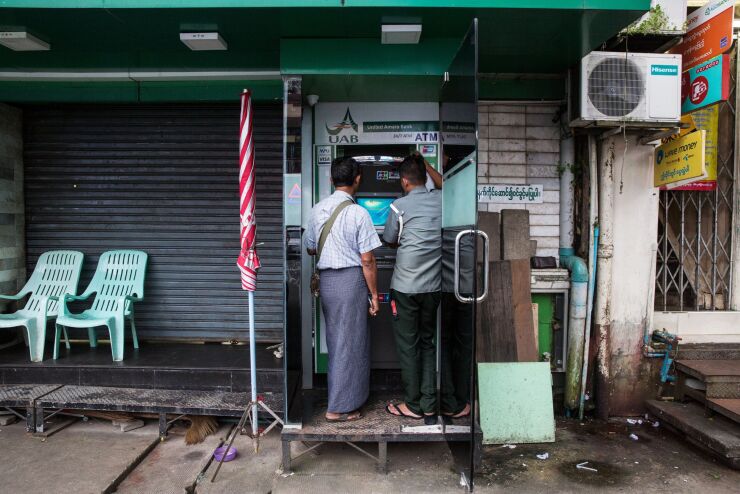Ousted leaders in Myanmar are launching a crypto-based bank to bankroll efforts to claw back government control from military rule and expand banking access to a population where already limited financial access has been further choked by two years of civil strife.
Named for the Spring Revolution — the protest movement against the ruling military junta — the "Spring Development Bank" will run on a blockchain-based network and perform currency swaps on a decentralized exchange with crypto-coins pegged to the U.S. dollar.
The neobank plans to offer currency swaps, loans, fixed deposits, prize-linked savings accounts and other financial services. The beta launch for the online bank is scheduled for Saturday, with plans for the bank to become fully operational in August, a spokesperson for the bank said Thursday.
Spring Development Bank's launch comes as an effort — spearheaded by supporters of the National Unity Government, the democratically elected shadow government recognized by the United Nations and the European Parliament that was toppled in the State Administration Council's military coup two years ago — to provide funding for the exiled government and widen financial access in a country where already limited banking access has been stymied by two years of authoritarian rule and conflict.
"It's basically a failed state at this point. The economy has collapsed and the banking system has collapsed. Poverty is endemic. The military is committing massive abuses all over the country," said Joshua Kurlantzick, senior fellow for Southeast Asia at the Council on Foreign Relations. "The NUG are trying anything possible to provide financial autonomy."
The neobank will enable users to donate directly to the revolutionary effort and bank in four currencies — U.S. and Singaporean dollars, the Thai Baht and the Myanmar kyat — convertible to the fiat-backed stablecoin Tether, when exchange rates are most favorable. Eventually, the bank plans to also support British pounds, euros, South Korean won, Japanese Yen and other currencies.
Run on the Ethereum-compatible blockchain network Polygon and based on the Uniswap Protocol, a decentralized exchange, the bank will offer a 2% spread on exchange swaps and a lottery program that consumers can enter with non-fungible tokens.
To protect its users from being targeted by the military junta, which has become notorious for its violent repression of dissidents, Spring Development Bank will run on a web-only platform to prevent an app from identifying its users.
"The bank's interface will look and feel like an application, but we encourage everyone to access it using their incognito window so it doesn't store any browser history," a bank spokesperson
Hard cash is
"We cannot just move funds into a banking system controlled by the military, so we have to provide this alternative financial system that's based on trust and guaranteed by the government," Tin Tun Naing, the governor of Myanmar's interim central bank and acting minister for finance and industry, told Cointelegraph.
Spring Development Bank also serves as an opportunity to expand banking access to the roughly 55 million Burmese living in the country — of whom three quarters were unbanked in 2019, according to a
"One thing [the NUG] is probably trying to do is provide services to the public," Kurlantzick said. "It's an incredibly impoverished population."
After being
Last year, the NUG planned to
But with technological access limited in a country wrecked by violence and where crypto is a foreign concept to most people, setting up a full-fledged bank may prove to be a hard undertaking.
"That's different than trying to set up banks with crypto in a country in an actual war zone," Kurlantzick said.
"You have weak internet access and an inability for many people to assess knowledge about global markets," Kurlantzick added. "You're talking about operating in something that's the equivalent of
But for revolutionaries already accustomed to unlikely odds, the bank's purpose is more straightforward.
"Spring Development Bank and the blockchain technology it's powered by is the natural progression in terms of a fundraising strategy for the NUG," a bank spokesman told Cointelegraph.






